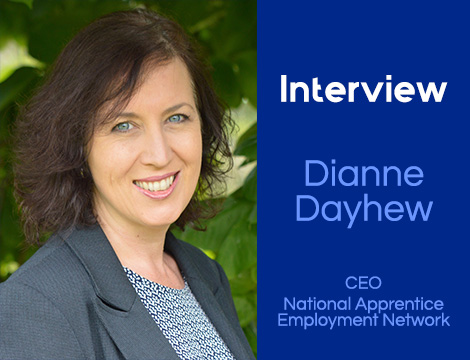
Dianne, in a nutshell, what has been your experience of working in the training and education industry?
I have worked in training, education and employment since the mid-1990s. I have seen many ministers, governments and policies come and go, great initiatives start, gain traction, and disappear. One thing about vocational education and training is that it is heavily impacted by government policy changes, and my career has adapted and changed often as a result of such changes.
The wonderful part has been working with colleagues who are extremely committed to vocational education and training, and the joy of seeing careers for young people and others in mid-career kick off as result.
What is the purpose of the National Apprentice Employment Network and how can training organisations benefit?
The purpose of the National Apprentice Employment Network is to advocate on behalf of employers of more than 25,000 employers of trainees and apprentices from diverse backgrounds and locations across Australia who are employed through Group Training Organisations (GTOs). GTOs provide an employment safety net for trainees and apprentices to assist retention and completion through supported pastoral care.
The GTO is the legal employer of the trainee or apprentice as part of a training contract with the training provider, which is lodged with the State or Territory Training Authority. The GTO has a separate agreement with a business or organisation to “host” the employment of the trainee or apprentice and release them for formal training and assessment on or off-the-job.
Some GTOs are also registered as training providers to deliver qualifications for their trainees and apprentices. Most GTOs have arrangements with external private training providers or TAFEs to deliver training and assessment. Like all customers of training providers, collectively GTOs in the NAEN network are prime clients seeking quality training delivery and outcomes.
Can you please let us know how NAEN works with Group Training Organisations (GTOs), employers, apprentices and trainees?
GTOs which belong to a state or territory Apprentice Employment Network are eligible to apply for NAEN membership, being the peak national body. Membership of our national association is extremely important to GTOs. With their operations at the whim of state territory and Commonwealth funding, NAEN is the communications channel between the Commonwealth government and GTOs.
We immediately relay important policy announcements and funding opportunities to members, and advocate on their behalf to government and parliament. This ensures that GTOs play a significant role in national trainee and apprentice initiatives.
How is your current role different from your previous roles?
Like many looking back at their career, mine has traversed many directions that now seem extremely relevant to my current role.
I have worked in many sides of education, industry training and employment, and have been employed in both industry and government entities. This includes educator, training programs marketer, field officer, manager, senior executive, policy and research writer, organisational development programs designer, industry stakeholder coordinator, board director and chair, and now CEO of a national peak body. I have an appreciation of the value of both accredited and non-accredited training as linchpins to strategic workforce development.
All roles have stemmed from my core belief that education transforms lives and accelerates careers. Vocational education and training provides workplace learning that is meaningful, applied, reinforced, recognised and rewarded. I have personal experience of providing dream career opportunities through the support of a GTO, making my current role as NAEN CEO highly motivating.
Let’s go back to the training and education industry. What do you think are the main threats to training organisations in the current environment?
Taking note of the futurists, we are all in the same boat working in a volatile and unpredictable world that is changing faster than we can plan. Resistance to change is a threat to all businesses, and reluctance to adopt new business models to maintain relevance is another common challenge.
Training providers operate in a highly regulated and competitive market and are at the mercy of policy changes from both Commonwealth and State or Territory governments. These can be viewed as both opportunities and threats.
The status of VET versus higher education is an ongoing concern. Compliance with standards is also crucial, but we must remember to focus on the person receiving the training. They need support, recognition and reward. National qualifications mean consistency, and the experience of the participant should adequately reflect the national standards expected by their chosen industry.
As we watch VET reform play out for another episode, we are now hearing leaders talk about candidates needing better options for lifelong learning, and that options from both VET and university should be promoted. We have to think about what this means for the apprenticeship model. Traditional models of training may be turned upside down and rearranged and integrated across education levels. I don’t know if we are ready for this. And how do we train people with the skills for jobs that haven’t been invented?
As an industry leader, what are your views on how we can improve the vocational education and training sector in Australia?
When things get a little confusing and overwhelming, it is useful to go back to the beginning and review our vision, mission and purpose. The Joyce Review seems to be redirecting us to do just this, and our hopes lie with all states and territories coming on board to support national reform.
The VET Fee Help period was a turning point for all of us, and a great reminder to focus on our participants. Training young people is not about making money, it’s about transforming lives.
Dianne Dayhew
CEO
National Apprentice Employment Network




